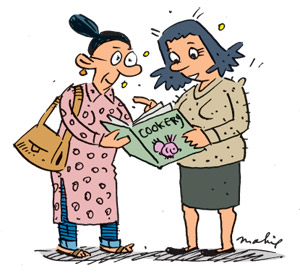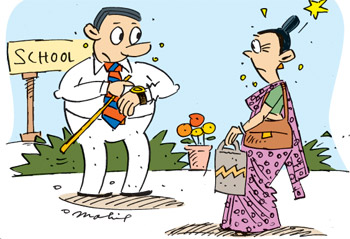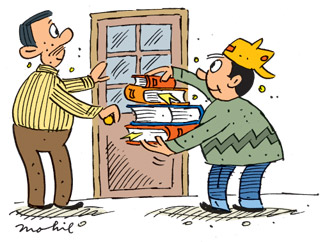|
 by
R. S. Karunaratne by
R. S. Karunaratne
Know what you ‘say’
‘Say’ is an irregular verb meaning “to express in words.” Sometimes
it can mean “to think “ or “to mean”. Let’s look at the grammar patterns
of “say”.
1. “Say” is used to talk about
speaking without saying exactly what is said.
|

The cookery book says
everything you should know. |
Permit me to say a few words on this occasion.
When I asked how she was getting on, she didn’t say anything.
What do you say , now?
You can say anything you like.
What can I say ?
2. “Say” is used to report statements
or opinions.
The director said that he would send me abroad.
Psychologists say that we are not using our brains properly.
The cookery book says everything you should know.
They say he is an efficient worker.
The coroner said the death was due to natural causes.
3. “Say” is used to ask about what is
said or what is not said.
Did he say when he was leaving?
The advertisement does not say where the office is located.
What did he say when he was dying?
Didn’t she say that she was an actor?
(‘actor’ is now used for both males and females)
4. “Say” is used to report directly
what somebody speaks or writes.
“You’re late”, the principal said to the teacher.
The penal code says those who steal will be punished.
The candidate said that he would develop the electorate.
The inspector said the suspect was lying.
5. “Say” is used along with ‘so’ to
refer back to what someone has expressed.
|

“You’re late”, the principal said
to the teacher. |
Will there be dry weather? - The Met Department says so.
If you didn’t like this house, you should say so.
6. “Say” is used to report what was
said, without mentioning who said it.
It is often said that liars look straight into your eyes!
It is said that wrong-doers suffer in this life itself.
7. “Say” is used to express what is
reported or believed.
Nearly 300,000 people are said to have been killed in the earthquake.
The principal is said to have warned the errant teacher.
8. The prepositions ‘about’ and ‘to’
go with “say”.
What did Lionel say about me?
Khan said hello to me in Mumbai.
Test your vocabulary
Give the meanings of the following words. You will come across all
these words in the course of normal reading.
01. Immaculate:
..............
02. Incessant:
...............
03. Ineradicable:
...............
04. Itinerary:
...............
05. Illustrious:
...............
06. Inconsiderate:
..............
07. Intransigent:
...............
08. Immutable:
...............
09. Incinerate:
...............
10. Illusive:
...............
11. Insensate:
...............
12. Importunate:
...............
***********
Key
1. Pure, spotless or faultless
2. Unceasing,continual
3. That which cannot be got rid of
4. A route or guide book
5. Distinguished, famous
6. Thoughtless, regardless of others
7. Uncompromising
8. Unalterable, unchangeable
9. To burn, to reduce to ashes
10. Deceptive
11. Unfeeling
12. Persistent
***********
Starters :
Polite requests
You can make polite requests using the following words:
1. Can
Can you mail this letter for me?
Can you meet me tomorrow?
Can you buy me a pen?
Can you pass the paper?
|

Will you open the door for
me? |
Can you close the window?
2. Could
Could you drive me to school?
Could you bring your notes tomorrow?
Could you call me later?
Could you park your car there?
Could you return my book?
3. Will
Will you pick up my papers?
Will you wait here till I come?
Will you open the door for me?
Will you meet me at the library?
Will you lend me your bicycle?
4. Would
Would you move a bit, please?
Would you propose the vote of thanks?
Would you keep this bird till
tomorrow?
Would you bring your camera?
Would you pass the spoon, please?
To all these polite requests you
can respond in the following way:
Affirmative
Sure (I can)
Certainly (I will)
Of course (I will)
Negative: I'm sorry, but I can't
Note:
Use the modals can, could, will and would to make a request. We use
could and would to soften the request and make it more polite. You can
also use please to make the request more polite. The word please can be
used in two places.
Would you close the window, please?
Would you please close the window?
We also use would you mind + gerund
(verb+ing) to make polite requests.
Would you mind waiting a minute?
Would you mind mailing this letter for me?
Would you mind driving me to the clinic?
Would you mind picking me up at office?
Would you mind turning on the TV?
Caution
When we answer this type of request
with not at all, it means that we will do
what the person requests.
Would you mind waiting here for me?
Response: Not at all. (= ok, I'll do it). |

